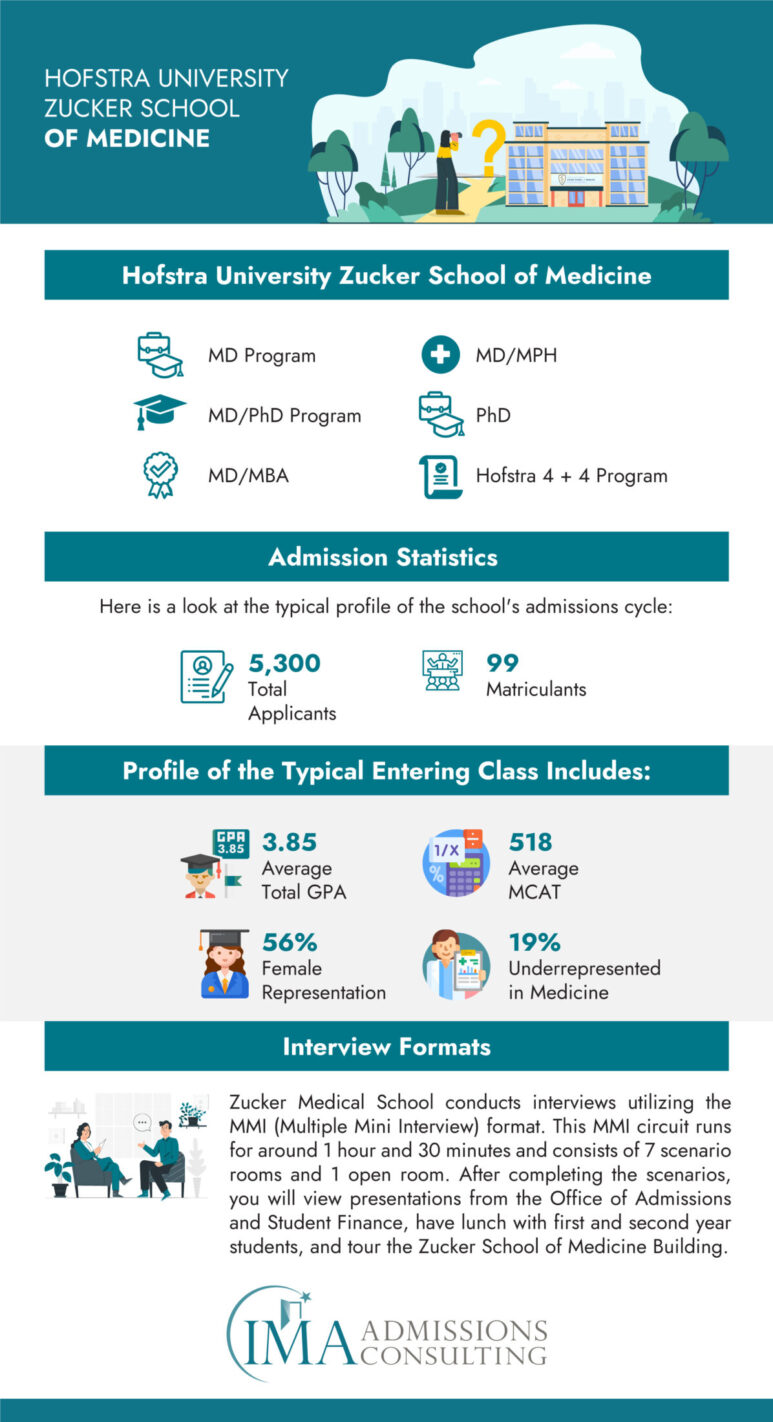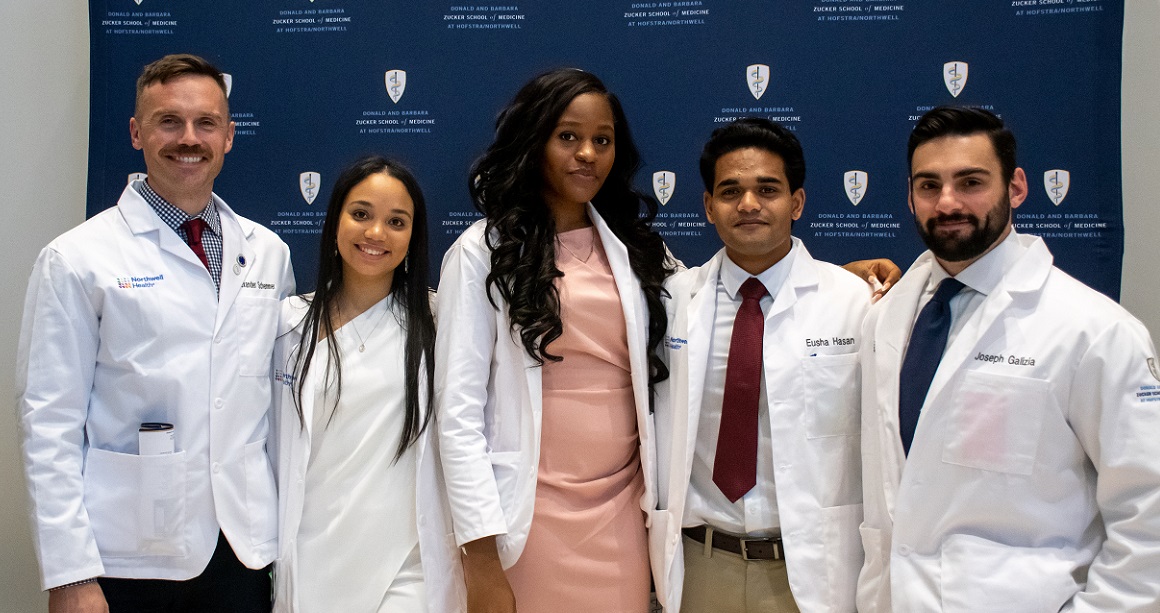The Hofstra Zucker School of Medicine, also referred to as the Donald and Barbara Zucker School of Medicine was established in 2008 by two equal partners: Northwell Health and Hofstra University. The college is built on the foundation of strong clinical and graduate medical education programs offered by Northwell Health and the robust research of Hofstra University. The university is an accredited institution and is accredited by the Liaison Committee on Medical Education (LCME).
Be an Informed Applicant
As you will find with the vast majority of medical schools across the United States, the Hofstra University Zucker School of Medicine has strict guidelines and requirements which are school specific. To best help students focus their application and have the best chance of acceptance, we find that is best to develop an understanding of the university’s identity, selection criteria, and values.
This article covers:
- Hofstra University Zucker School of Medicine Rankings
- Medical Programs at Zucker Medical School
- Selection Factors: What Hofstra University Zucker School of Medicine Looks for in an Applicant
- Academic Requirements
- Hofstra University Medical School Acceptance Rate, Class Profile, and More
- AMCAS Primary Application and Hofstra University Zucker School of Medicine Secondary Application
- Zucker Medical School Secondary Application: Essay Prompts, Sample Essay Answers, and Advice
- Medical School Admissions Consulting Services
- Voluntary Healthcare Internships Abroad
Personalized Help
We at International Medical Aid understand how tough the medical school application process can be. There are many steps involved from completing your primary application to filling out a secondary application and interviewing for a spot in the college’s medical program.
It is our goal to help make navigating this process as easy as possible for students. We achieve this by offering professional medical admissions consulting services. Our medical school admission consultants work with students one-on-one to offer constructive feedback, help them develop an application strategy, prep for interviews, and ensure they present the best and most competitive application possible.
If you feel overwhelmed and lost by the med school application process, do not hesitate to reach out and seek the help of our medical school admissions consulting services.
Why Hofstra University Zucker School of Medicine?
In addition to being an LCME-accredited college, Zucker Medical School offers a variety of great programs for students to choose from, has 25 academic departments, over 3,100 faculty members, and follows a system of 10 essential values. The college offers a variety of medical specialty education with notable faculty members such as Avner Hershlag, MD and Karin Verlaine Rhodes, MD, MS. Avner Hershlag, MD is a Professor of Obstetrics, and Karin Verlaine Rhodes, MD, MS is a Clinical Professor at the university.
Zucker Medical School is guided by the mission and values of the university. The institution seeks to uphold the 10 core values which they believe to be vital in the medical field. The values are:
- Community
- Scholarship
- Innovation
- Learning
- Humanism
- Diversity
- Professionalism
- Patient Centeredness
- Reflection
- Vision
Hofstra University Zucker School of Medicine Rankings
- #64 in Best Medical Schools: Research
- #94 in Best Medical Schools: Primary Care
- #35 Most Diverse Medical Schools
- #76 Most Graduates Practicing in Medically Underserved Areas
- #161 Most Graduates Practicing in Primary Care Fields
- #156 Most Graduates Practicing in Rural Areas
Medical School Programs at Zucker Medical School
Students should take their time to thoroughly research the various programs offered at Hofstra University Zucker School of Medicine before applying. Conducting thorough research into what the university has to offer will help you make the best and most informed decision possible, and allow you to focus your application strategy.
Hofstra University Zucker School of Medicine offers several degree options for students to choose from. In this article, we will go over the 6 programs they offer.
MD: Doctor of Medicine
Zucker Medical School offers a standard 4-year MD program. The college values learning over teaching and students are often self-directed learners. The curriculum is split into the first 100 weeks (years 1 and 2) and the second 100 weeks (years 3 and 4).
During the first 100 weeks, the curriculum is comprised of 7 integrated courses: CPR (Challenges, Privileges, and Responsibilities), BI (Biologic Imperative), FTB (Fueling the Body), HOM (Homeostasis), IE (Interacting with the Environment), HMI (Host-Microbe Interactions), and HC (The Human Condition).
The second 100 weeks consist of students rotating through paired clerkships to integrate basic and clinical sciences, both in inpatient and ambulatory settings.
Here are some of the guiding principles of the curriculum:
- Staying true to the school’s mission, drivers, and values
- Fully integrated, developmental 4-year science and clinical curricula
- Integration of health, disease, and intervention
- An adult learner environment
- Experiential and active small group case-based learning
- Conceptual knowledge in action, not merely memorizing facts
- Early meaningful patient interactions
- Emphasis on scholarship, lifelong learning, and critical thinking
- Focus on learning not teaching
- Assessment drives learning
- Emphasis on assessment, reflection, and transformation
Other Degree Programs
MD/PhD: Dual Doctor of Medicine/Doctor of Philosophy, Molecular Basis of Medicine – The goal of this program offered by Zucker Medical School is to train individuals to pursue scholarly activity in clinical, translational, and biomedical research with the goal of improving medical care for the population.
MD/MPH: Joint Doctor of Medicine/Master of Public Health – The goal of this program is to graduate physicians who have an increased understanding of economic, social, behavioral, and political determinants of health and the skills needed to apply this knowledge to improve the health of populations.
MD/MBA: Joint Doctor of Medicine/Master of Business Administration – This program is best suited for students who want to acquire business core competencies and leadership and decision analysis skills.
PhD: Doctor of Philosophy, Molecular Basis of Medicine – This program aims to prepare individuals for investigative careers in translational and disease-related research.
Hofstra 4 + 4 Program: BS-BA/MD: Dual Bachelor of Arts or Bachelor of Science/Doctor of Medicine – This program aims to attract students who are interested in the creative approach to advanced learning.
Selection Factors: What Hofstra University Zucker School of Medicine Looks for in an Applicant
Are you curious about what values and requirements Hofstra University Zucker School of Medicine admissions committee is looking for—scores, traits, and more?
Most med schools across the United States take a holistic approach to reviewing incoming applications. A holistic approach leads the committee to view your application as a whole and try to obtain the big picture of who you are, not just how well you scored on a test. For more information about the general values medical schools are looking for, check out the AAMC Core Competencies.
The university’s website states that in addition to the standard academic criteria, the college also seeks to bring in the most diverse and unique classes possible. Factors in class diversity include:
- Age
- Gender
- Ethnic and Racial Background
- Socioeconomic Background
- Educational Background
- Professional Background
- Geographic Background
- Status as a First-generation College Student
- Interest in Different Medical Specialties
- Interest in Working With Medically Underserved Populations
Application Requirements for Zucker Medical School
Hofstra University Zucker School of Medicine has guidelines, prerequisites, and academic criteria that students must meet in order to be considered for acceptance. Applicants must meet the necessary requirements to receive a secondary application. Please note that to complete the Zucker Medical School secondary application, applicants must pay a fee of $125.
GPA and MCAT Requirements for Hofstra University Zucker School of Medicine
The university does not have a minimum required MCAT or GPA score for application. However, the college bases their score requirements on the previous class of matriculants. Based on the college’s most recent class profile, matriculants had an average GPA of 3.85 and an average MCAT score of 518.
Keep in mind that most medical schools will only accept MCAT scores that are no more than 3 years old. If your MCAT score is older than 3 years or you have yet to take the MCAT exam, consider registering for one of the upcoming test dates.
Zucker Medical School Letter of Recommendation
Hofstra University Zucker School of Medicine requires applicants to provide at least 1 letter of recommendation. The university prefers a premedical committee letter, but if your school does not have a premedical committee or a considerable amount of time has passed since you graduated, you can submit 3 individual letters of recommendation. 2 of the letters should be from professors (1 should be a science professor) and 1 letter can be from a non-academic professional.
All letters should be submitted with your AMCAS application, and you are free to send more than 3 letters, but the college does not guarantee that additional letters will be read.
Recommended Coursework
Hofstra University Zucker School of Medicine does not have a list of prerequisites needed to apply, they do highly recommend successfully completing the following courses.
Biology – 1 Year With Labs
Chemistry – To the Level of Organic and Biochemistry
Math – 1 Year of College Math, Preferably Statistics
Physics – 1 Year
English – English Literature or the Equivalent, Including Writing
Does Hofstra University Zucker School of Medicine Require the CASPer exam?
The CASPer exam is an online situational judgment test designed to help an admissions committee gain a further understanding of a candidate’s non-academic abilities.
Currently, the CASPer exam is one of the university’s listed requirements for application.
Zucker Medical School Acceptance Rate and Admission Statistics
The Hofstra University Zucker School of Medicine has a very competitive acceptance rate of 1.62%. If you want to be accepted into Zucker Medical School, you will need to ensure that your stats are competitive and that you exhibit the traits the committee is looking for.
Here are some of the average admission stats for the most recent entering class:
- 5,300 Applicants
- 99 Accepted Into Each Class
- 3.85 Overall Median GPA
- 518 Median MCAT Score

Hofstra University Zucker School of Medicine Tuition and Cost of Attendance
Students will need to budget for various costs including tuition, textbooks, living expenses, and personal expenses. The college has provided a rough estimated budget for the yearly cost of attendance. All costs reflect those of the university’s “living on campus” estimate.
Year 1:
- $56,400 Tuition and Fees
- $25,044 Room and Board
- $1,700 Books and Supplies
- $3,659 Personal Expenses
- $450 Education Loan Fees
- $920 Transportation
- $88,173 Total
Year 2:
- $56,400 Tuition and Fees
- $24,500 Room and Board
- $770 Books and Supplies
- $3,293 Personal Expenses
- $645 USMLE Fees
- $430 Education Loan Fees
- $686 Transportation
- $86,724 Total
Year 3:
- $56,400 Tuition and Fees
- $26,131 Room and Board
- $1,050 Books and Supplies
- $4,391 Personal Expenses
- $645 USMLE Fees
- $500 Education Loan Fees
- $5,716 Transportation
- $94,833 Total
Year 4:
- $56,400 Tuition and Fees
- $25,588 Room and Board
- $0 Books and Supplies
- $4,669 Personal Expenses
- $480 Education Loan Fees
- $5,030 Transportation
- $92,167 Total
AMCAS Primary Application and Hofstra University Zucker School of Medicine Secondary Application
The AMCAS application is the standardized and accepted primary application used by most medical schools in the United States. It typically takes medical schools between 4 to 6 weeks to review your primary application.
After the committee has reviewed your primary application, if they feel you may be a good fit for the college, they will invite you to complete their secondary application. Secondary applications are highly school-specific and it is important to note that failure to meet the school’s requirements will prevent you from being invited to complete a Hofstra secondary application.
If you would like further clarification about the difference between primary and secondary applications, read our helpful guide about applications.

Zucker Medical School Secondary Application: Essay Prompts, Sample Answers, and Advice
One of the most important steps when applying for medical schools is completing secondary applications. Most secondary applications consist of a series of questions and essay prompts that are designed to allow the applicant to further express who they are as a person and candidate. This is your time to discuss your career goals, ambitions, and motivations. Here are some of our best tips for creating strong secondary application answers:
- Pay close attention to the questions and prompts, ensuring that you read them thoroughly and answer all parts of the question.
- Provide concrete evidence for your answers. Concrete evidence can come from your professional, work, and academic experiences.
- Do not repeat information from your primary application.
- Proofread your answers
- Ensure that you write clearly and concisely
- Consider seeking the guidance of a medical school admissions consultant.
The Hofstra secondary application consists of 3 essay prompt questions, all of which have a 1500-character limit.
Essay #1
If you are currently not a matriculated student, please indicate what you have been doing since the time of graduation until now. (1500 characters)
This prompt will not apply to all students, but if you have taken a break in your education or gap year for any reason, this is an excellent opportunity to explain the gap in your education.
Here is a sample answer:
As the admissions committee will see from my transcripts, I have taken a gap year between completing my undergraduate education and beginning my medical education. I elected to take the gap year to further my volunteer and clinical experiences in hopes of creating a more competitive medical school application.
So far, I have spent this time volunteering at several local medical facilities, such as clinics, doctor’s offices, and hospitals. I have also volunteered in non-medical settings such as food banks and homeless shelters.
Essay #2
If your undergraduate education was interrupted for any reason, please indicate the reasons, the duration of the interruption, and how you spent your time. (1500 characters)
This is another prompt that will not be applicable to everyone but allows applicants a chance to explain any disruptions in their undergraduate education.
Here is a sample answer:
During my undergraduate education, I experienced a small interruption lasting approximately two months. This disruption was caused due to COVID-19 as the college I was attending shut down for a two-month period before resuming in an online class setting. While there was not much opportunity for me to partake in volunteer opportunities, I chose to take an online medical terminology course to further my education and prep me for medical school.
Essay #3
Please share anything your application does not include, but that you would like to bring to our attention. (1500 characters)
If you have any experiences that are not included in your application or additional courses you’ve taken, this is a great time to present those to the committee.
Here is a sample answer:
In the time between submitting my AMCAS application and completing this secondary application, I had the chance to participate in a pre-med shadowing study abroad program which is not reflected on my application. This program allowed me to shadow doctors, explore new locations, hone my communication skills, and learn more about how clinics and hospitals run on a day-to-day basis.
Medical School Admission Consulting Services
Our goal is to provide aspiring physicians with accurate and detailed information to help aid them in their medical school application process. The process of applying for med schools is easily one of the hardest parts of your medical education journey.
The best way to ease the stress of this process is by enlisting the professional help of medical school admissions consulting services. Whether you need help perfecting and editing your secondary application essays, developing your application strategy, or starting the application process, International Medical Aid is here to help.
Those who need extra guidance with this process should visit our medical school admissions webpage and schedule a free consultation with us.
Voluntary Healthcare Internships Abroad
It’s no secret that one of the key parts of faring well during the application process is having a compelling and competitive application. But how do you achieve a competitive application? While all parts of your application play a role, your clinical experiences and volunteer service can set you apart from the sea of applicants.
What’s the best way to gain clinical and volunteer experience? While there are plenty of ways to do so, pre-med shadowing study abroad programs provide volunteer and clinical experience at the same time. Not to mention these programs look great on any medical school application.
IMA’s pre-med shadowing study abroad programs allow aspiring physicians to travel to areas like the Caribbean and East Africa where they can shadow doctors and work with the medically underserved. Students who take part in these programs gain much more than a compelling application. They gain broadened perspectives, memories, healthcare insights, and valuable doctoring knowledge they will carry with them for a lifetime.
Good Luck!
From all of us at International Medical Aid, we want to wish you luck as you embark on your educational journey to become a medical professional. We want to remind you to take your time, develop a strong application strategy, and always ask for help if you feel you need it.
If your mind is still filled with questions like “what are the best medical schools near me” or “which school is right for me” then we highly recommend checking out our other medical school guides. We have articles on medical schools across the country, including other New York medical colleges.
- Weill Medical College of Cornell University
- University of Rochester Medical School
- Icahn School of Medicine at Mount Sinai
- Renaissance School of Medicine at Stony Brook University
- Albert Einstein College of Medicine
- Ohio University Heritage College of Osteopathic Medicine
- Northeast Ohio Medical University (NEOMED)
- University of Cincinnati College of Medicine
- University of Toledo College of Medicine
- Wright State University Boonshoft School of Medicine
- Ohio State University College of Medicine
- Rowan University School of Osteopathic Medicine
- Hackensack Meridian School of Medicine (HMSOM)
- Rutgers New Jersey Medical School (NJMS)
- Rutgers Robert Wood Johnson Medical School
- Cooper Medical School of Rowan University (CMSRU)
- A.T. Still University Kirksville College of Osteopathic Medicine
- Saint Louis University School of Medicine
- University of Missouri Medical School
- Kansas City University (KCU)
- UMKC School of Medicine
- New York Medical College
- University of Pittsburgh School of Medicine
- University of Wisconsin Medical School
- VCU School of Medicine
- University of Maryland School of Medicine
- Case Western Medical School
- University of North Carolina Medical School
- University of Florida Medical School
- Emory University School of Medicine
- Boston University College of Medicine
- California University of Science and Medicine
- UC San Diego Medical School
- California Northstate University College of Medicine
- Touro University of California
- CHSU College of Osteopathic Medicine
- UC Davis School of Medicine
- Harvard Medical School
- UC Riverside School of Medicine
- USC Keck School of Medicine
- UT Southwestern Medical School
- Long School of Medicine at UT Health San Antonio
- University of the Incarnate Word School of Osteopathic Medicine
- UT Austin’s Dell Medical School
- UTMB School of Medicine
- McGovern Medical School at UT Health
- Johns Hopkins School of Medicine
- McGovern Medical School at UT Health
- The University of Texas Rio Grande Valley School of Medicine
- UNT Texas College of Osteopathic Medicine
- University of Houston College of Medicine
- Texas A&M College of Medicine
- Johns Hopkins Medical School
- Baylor College of Medicine
- George Washington University School of Medicine
- Vanderbilt University School of Medicine
- St. George’s University School of Medicine
- Lake Erie College of Osteopathic Medicine (in Pennsylvania)
- Sidney Kimmel Medical College at Thomas Jefferson University
- Wake Forest University School of Medicine
- Western University of Health Sciences (in California)
- Drexel University College of Medicine
- Stritch School of Medicine at Loyola University Chicago
- Georgetown University School of Medicine
- Yale School of Medicine
- Perelman School of Medicine
- UCLA Medical School
- NYU Medical School
- Washington University School of Medicine
- Brown Medical School











